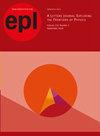重新认识和解释库珀对、费米海、泡利封锁和超流:集体运动中的泡利原理
IF 1.8
4区 物理与天体物理
Q2 PHYSICS, MULTIDISCIPLINARY
引用次数: 0
摘要
自从最初的BCS理论问世以来,确定超流可能的微观机制一直是各种研究的目标。最近,一系列论文提出了基于法线模式的微观动力学,以描述超流,而无需使用实空间库珀对。所确定的多种特性与实验数据非常吻合。这种一般 N 体方法的群论基础允许对这些结果背后的微观行为进行详细分析。这种重新想象现在被用来重新解释几个相互关联的现象,包括库珀对、费米海和保利封阻。这种方法与超导/超流态的早期信条密切相关,后者认为配对只存在于动量空间,而非实际空间。最近揭示的保利原理在集体运动中的作用被用来选择允许的正常模式。讨论了超流动的预期特性,包括波函数的刚性、不同配对中费米子之间的相互作用、动量的收敛以及激发光谱中的间隙。本文章由计算机程序翻译,如有差异,请以英文原文为准。
Reimagining and reinterpreting Cooper pairs, the Fermi sea, Pauli blocking and superfluidity: The Pauli principle in collective motion
Identifying possible microscopic mechanisms underlying superfluidity has been the goal of various studies since the introduction of the original BCS theory. Recently a series of papers have proposed microscopic dynamics based on normal modes to describe superfluidity without the use of real-space Cooper pairs. Multiple properties were determined with excellent agreement with experimental data. The group theoretic basis of this general N-body approach has allowed the microscopic behavior underlying these results to be analyzed in detail. This reimagination is now used to reinterpret several interrelated phenomena including Cooper pairs, the Fermi sea, and Pauli blocking. This approach adheres closely to the early tenets of superconductivity/superfluidity which assumed pairing only in momentum space, not in real space. The Pauli principle is used, in its recently revealed role in collective motion, to select the allowed normal modes. The expected properties of superfluidity including the rigidity of the wave function, interactions between the fermions in different pairs, convergence of the momentum and the gap in the excitation spectrum are discussed.
求助全文
通过发布文献求助,成功后即可免费获取论文全文。
去求助
来源期刊

EPL
物理-物理:综合
CiteScore
3.30
自引率
5.60%
发文量
332
审稿时长
1.9 months
期刊介绍:
General physics – physics of elementary particles and fields – nuclear physics – atomic, molecular and optical physics – classical areas of phenomenology – physics of gases, plasmas and electrical discharges – condensed matter – cross-disciplinary physics and related areas of science and technology.
Letters submitted to EPL should contain new results, ideas, concepts, experimental methods, theoretical treatments, including those with application potential and be of broad interest and importance to one or several sections of the physics community. The presentation should satisfy the specialist, yet remain understandable to the researchers in other fields through a suitable, clearly written introduction and conclusion (if appropriate).
EPL also publishes Comments on Letters previously published in the Journal.
 求助内容:
求助内容: 应助结果提醒方式:
应助结果提醒方式:


